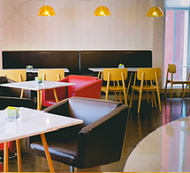Can You Use Kickstarter to Open a Restaurant?
Posted by May. 09, 2017 | BY Julia Mullaney on May 19th 2017

It seems as though every day, a new crowdfunding campaign is being promoted on social media—some for personal expenses, some for travel plans, and some for opening new restaurants. If you’re considering launching a restaurant Kickstarter, a fundamental question is probably consistently in the back of your mind: Is it worth it?
Read on to find out whether restaurant campaigns are realistic—plus learn a few tips to help you succeed.
What is Kickstarter?
Kickstarter is a website whose mission is “to help bring creative projects to life.” It allows people to start online fundraisers for any project they have in mind, using money from “backers” who pledge an amount of their choice to a person’s idea. It’s an all-or-nothing campaign style; if the project owner doesn’t meet his or her funding goal, no money gets collected. You can start up nearly anything on Kickstarter, from art projects to short films to, of course, restaurants.
Kickstarter breaks down its statistics into 15 categories. The food category has seen just over 22,000 projects launched since Kickstarter’s beginning. Of the $112 million pledged to food projects, $93 million have resulted in successful campaigns (about 83%). While these dollar amounts may seem to indicate a great success rate, of the 22,000 projects launched, only about 24% have actually met their goals.
In our article about restaurant myths, we learned that it costs anywhere from $100,000 to $300,000 (on the low end) to start a fully equipped restaurant. Of the 22,000 food campaigns, only 62 successfully raised $100,000 or more—not even 1%.
It’s important to keep in mind that the “food” category can entail anything food related; restaurants are only a small part of the category. In a 2014 interview with Kickstarter CEO Yancey Strickler, Strickler said there had been about 500 successful restaurant projects so far. That number has likely increased since then, but even if it doubled, successful restaurant campaigns would still only make up about 4% of total food projects.
With that said, there are ways to up your chances for having a successful campaign. While there is no guaranteed recipe for success, following some of these tips just might get you the results you’re looking for.
4 Tips for Launching a Restaurant Kickstarter
1. Rewards, rewards, rewards. It is imperative to offer something in return for backers’ money. Whether it’s a $25 or a $10,000 reward, everyone who pledges deserves a little something—or a big something—in return. For ideas about what type of rewards to offer, check out the most successful restaurant campaign Kickstarter has ever seen, and see what they pitched to backers.
2. Pitch your idea to people you know first. When people know you and know your work ethic, they know you’ll work hard for success. Plus, people love to help out those they care about. Before going live with your campaign, tell people in your life about it. Odds are, they’ll want to help out in any way they can.
3. Put yourself out there. Let people know about the person behind the campaign. Make a compelling video detailing why and how your project is going to be successful. Videos allow people to really envision what you’re trying to sell them. If you’re unfamiliar with making videos, check out these success tips.
4. Don’t rely on Kickstarter for all the funding. Of the 5,500 successful food campaigns, 76% had a goal of less than $20,000. Although that is not enough to build a restaurant from the ground up, it does put a dent in expenses…and every little bit helps.
A successful Kickstarter campaign wholly depends on the person(s) behind it. Someone who creates a video, pitches the idea to friends and family, offers excellent rewards, and seeks a realistic goal will likely have a much more successful campaign than someone who does not put in enough thought and energy.
One final note: Don’t be completely discouraged by the statistics. While fewer than a quarter of food campaigns have seen success, every idea is unique. Yours just might be special enough to win over the backers you need.

